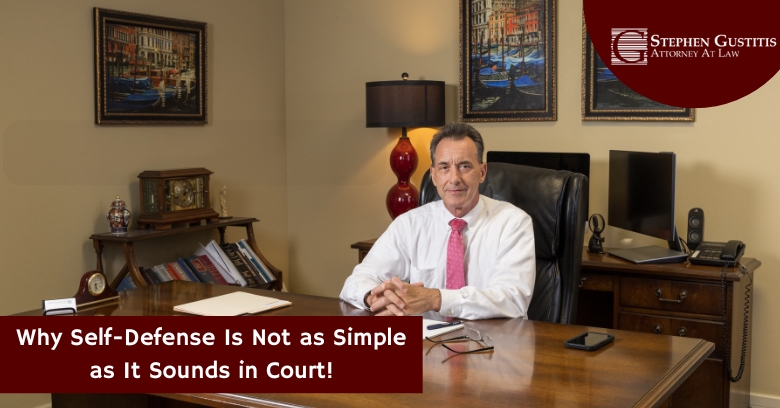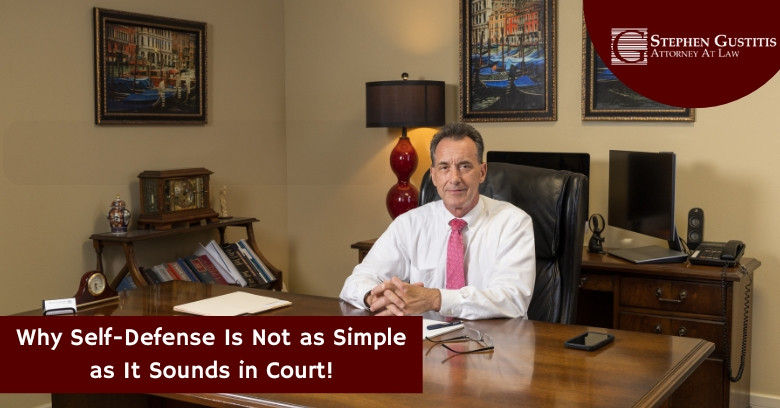Self-Defense Claims: What Makes Them Complicated in Real Cases
College Station, United States - November 4, 2025 / Stephen Gustitis, Criminal Defense Attorney /
A recently published blog article by Stephen Gustitis, Attorney at Law, titled “Why Self-Defense Is Not as Simple as It Sounds in Court,” provides valuable insight into how self-defense cases are evaluated under Texas law. The publication underscores the importance of experienced criminal defense lawyers who can help defendants navigate the legal standards and evidentiary challenges that arise when self-defense is claimed in court.
The Complex Reality of Self-Defense Claims Explained by Criminal Defense Attorneys
Texas law allows individuals to protect themselves when threatened, but determining whether an act qualifies as lawful self-defense involves complex legal interpretation. Courts carefully examine not just what occurred, but whether the use of force was reasonable and proportional to the threat faced.
Key factors considered in self-defense cases include:
Whether the accused reasonably believed they faced imminent harm.
Whether the level of force used was necessary and justified.
Whether opportunities existed to avoid or de-escalate the situation.
Even in genuine cases of fear or danger, misunderstandings of these standards can lead to criminal prosecution. This is why guidance from knowledgeable criminal defense attorneys is essential to protect the rights and reputation of the accused.
Factors Leading to the Failure of Self-Defense Claims in Texas Courts
According to Stephen Gustitis, Attorney at Law, many defendants fail to secure acquittals not because their actions were unlawful, but because their cases were poorly documented or improperly presented. The legal system demands credible, consistent, and admissible evidence.
Criminal defense law firms often see valid self-defense arguments undermined by:
Conflicting witness accounts that distort the sequence of events.
Insufficient evidence, such as missing video footage or absent medical documentation.
Premature statements to police, which may contradict later testimony.
Excessive force perceptions, where the defensive action appears disproportionate to the threat.
Skilled criminal defense lawyers ensure that every piece of evidence aligns with legal definitions and is presented clearly and convincingly before the court.
Common Misconceptions Clarified by Criminal Defense Attorneys
Public understanding of self-defense often differs sharply from its legal application. Stephen Gustitis notes that misconceptions about “stand your ground” and “castle doctrine” laws frequently mislead defendants into believing they are automatically protected from prosecution.
Prevailing myths include:
Using any level of force is justified if threatened.
Texas law only permits the degree of force reasonably necessary to stop the threat.
Self-defense guarantees immunity from charges.
Every incident is investigated, and justification must be proven through evidence.
Legal counsel is unnecessary when acting lawfully.
The burden of proof and interpretation of evidence still rest heavily on the defendant’s side.
Experienced criminal defense attorneys help clients counter these misconceptions by explaining the realities of Texas law and preparing a solid defense strategy rooted in fact and procedure.
Recommended Actions After a Self-Defense Incident
Practical, immediate action following a self-defense situation can strongly influence how a case unfolds. Legal professionals at Stephen Gustitis, Attorney at Law recommend the following:
Contact authorities immediately and provide only essential facts until legal counsel is present.
Refrain from making public comments or social media posts about the incident.
Document all available evidence, including photographs, video footage, and witness details.
Retain qualified criminal defense lawyers as soon as possible to protect legal rights.
“In Texas, outcomes in self-defense cases are shaped by preparation, not assumptions,” stated Stephen Gustitis, Attorney at Law.
“The key is evidence—preserve it, document it, and secure professional representation immediately. Even simple details such as recording visible injuries, obtaining medical reports, or identifying nearby witnesses can make the difference between a dismissed case and a conviction.”
This perspective highlights the value of proactive, informed steps taken immediately after an incident to strengthen one’s legal standing.

Representation by Established Criminal Defense Law Firms in Texas
With over two decades of legal experience, Stephen Gustitis, Attorney at Law, continues to serve individuals throughout Bryan and College Station facing serious criminal allegations. The firm is recognized among trusted criminal defense law firms for its strong courtroom advocacy and client-centered approach in cases involving assault, violent crime, drug charges, and self-defense claims.
The recent article from Gustitis Law reinforces the message that self-defense, while a fundamental right, requires careful handling under Texas statutes. The firm’s dedication to thorough investigation, strategic defense, and legal education reflects its mission to protect clients and uphold the principles of justice.
About Stephen Gustitis, Attorney at Law
Stephen Gustitis is a board-certified criminal law specialist with more than 25 years of courtroom experience. Based in Bryan, Texas, his firm—Gustitis Law—is committed to defending individuals accused of crimes ranging from assault and drug possession to homicide and self-defense cases. Known for meticulous preparation and dedication to fairness, the firm continues to stand as a reliable choice for Texans in need of skilled criminal defense lawyers.

Contact Information:
Stephen Gustitis, Criminal Defense Attorney
307 Arguello Drive
College Station, TX 77840
United States
Stephen Gustitis
(979) 701-2891
https://www.gustitislaw.com/
Original Source: https://www.gustitislaw.com/why-self-defense-is-not-as-simple-as-it-sounds-in-court/


